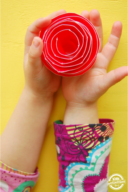This how to make a lemon battery tutorial is perfect for a quick science fair project, a super fun home science experiment or classroom science activity. I didn’t even realize you could make a battery out of a lemon!

Kids Activities Blog loves this project for making a fruit battery because it is a great way to teach science for kids.
Related: Check out our many fun science experiments for kids
This experiment offers great insight into the the complexity of a battery by breaking it down in simple terms. It also provides an awesome hands-on, visual representation of how it all works. By using a few items you already have in your home, constructing a lemon battery is an inexpensive way to see how electricity works!
This article contains affiliate links.
Lemon Battery Kids Can Make
The goal of making a lemon battery is turning chemical energy into electrical energy, creating enough electricity to power a small LED light or a watch. You can also use limes, oranges, potatoes or other acidic foods. This experiment can be educational for children, with adult supervision.
–Sciencing, Lemon Battery Facts
Simple Lemon Battery Made with Household Materials
When your kiddo comes home with news that it is science fair time at school a quick, easy, and educational option is the lemon battery. Recently, our two older kids, ages 7 and 9, presented ‘Lemon Power’ to their classmates and they were all awe struck.
Who wouldn’t be fascinated by using a lemon as a battery?
Related: A massive list of science fair ideas for kids of all ages
The process is simple and fun for the entire family.

Supplies You Need to Make a Lemon Battery
- 4 lemons
- 4 galvanized nails
- 4 pieces of copper (you can even use a copper penny, copper strip or copper wire)
- 5 alligator clips with wires
- A small light to power up

How to Do a Lemon Battery Experiment
Step 1
Roll and squeeze the lemons to release the lemon juice and pulp inside.
Step 2
Insert one galvanized zinc nail and one piece of copper or copper coin into each lemon with a small cut.
Step 3
Connect the ends of one wire to a galvanized nail in one lemon and then to a piece of copper in another lemon. Do this with each of your four lemons until you have them all connected. When you are finished you should have one nail and one piece of copper unattached.
Step 4
Connect the unattached piece of copper (positive) and the unattached nail (negative) to the positive and negative connections of your light. The lemon will act as the battery.
Step 5
Turn on your light and voila you have powered up using lemon power.

Fruit Battery Science Experiment
Once the light turns on and your littles realize that it is being powered by the lemon battery they created, have your camera ready because the smile on their face will be priceless.
The end result is not only a greater understanding but also a greater appreciation for the lemon whose uses far exceed being used to simply make lemonade.
More Science Activities & Experiments from Kids Activities Blog
The annual science fair is a great way for kids to learn about the world around them. We hope this idea for how to make a lemon battery helps your child understand lemon power through an easy, hands on demonstration. We have other great science fair ideas though that you might like!
- You make love this “What Is Static Electricity” project.
- Not “electrifying” enough? Then take a look at how a magnet can actually attract a dollar bill! It’s pretty cool.
- You may also like this bridge building activity for kids as well.
- If none of these science experiments are what you are looking for then check out this list of fun science activities for kids.
How did your lemon battery turn out?





















fortnite
I have a question. Can battery powered light bulbs work for this activity?
I am not sure about that!
Am i using thesame step for the potato
This is a great idea! Here at Queens Hotel we wish you and your readers a splendid summer ahead. Why not join us for a warm relaxing welcome, with great attractions and amusements close by for all the family to enjoy?
This looks awesome!! Where did you find the alligator clip wires? Thanks!
At this moment I am ready to do my breakfast, when having my
breakfast coming again to read other news.
I am not to sure about just the children enjoying this activity, But i think the adults would love to have a go too!!